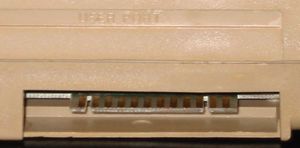User Port

|
This article is very short and not very detailed. Please help to improve it. |

The user port connects external devices such as modems and printers to the Commodore 64. Commodore's Automodem, 1660, 1670; Taihaho, Westridge, and so on, plug into the user port directly, supplying 2400 baud. However, non-Commodore printers and modems will only connect via an RS-232 adapter. The user port also connects the C64 to other systems, such as PCs and Arduinos.
The 6526 IC manages the user port. It is accessed via PEEK and POKE commands from BASIC. Lines 0-7 are the Parallel Port (input / output).
The C64 and C128 share the same user port standard, but it differs from other Commodore computers. The Plus/4 manual refers to its communication port as the RS-232 port. The VIC-20 is the same, on 1-3, 9-12 A, C-L, and N. The PET shares the same connector (called J2), with a similar eight-bit port on the same pins (C-L).
The port edge connectors have 3.96mm pitch (distance between contacts) and accept cards (PCBs) 1.57mm thick. The orienting notches that prevent upside-down insertion are "polarizing keys."

| Pin | Name | Description |
|---|---|---|
| 1 | GND | Ground |
| 2 | +5V | +5 VDC (100 mA max) |
| 3 | /RESET | Reset, will force a cold start. Also a reset output for devices. |
| 4 | CNT1 | Counter 1, from CIA #1 |
| 5 | SP1 | Serial Port 1, from CIA #1 |
| 6 | CNT2 | Counter 2, from CIA #2 |
| 7 | SP2 | Serial port 2, from CIA #2 |
| 8 | /PC2 | Handshaking line, from CIA #2 |
| 9 | ATN | Serial attention in |
| 10 | 9VAC | 9 VAC (+ phase) (100 mA max) |
| 11 | 9VAC | 9 VAC (- phase) (100 mA max) |
| 12 | GND | Ground |
| A | GND | Ground |
| B | /FLAG2 | Flag 2 |
| C | PB0 | Data 0 |
| D | PB1 | Data 1 |
| E | PB2 | Data 2 |
| F | PB3 | Data 3 |
| H | PB4 | Data 4 |
| J | PB5 | Data 5 |
| K | PB6 | Data 6 |
| L | PB7 | Data 7 |
| M | PA2 | PA2 |
| N | GND | Ground |
Programming the User Port[edit | edit source]
Links[edit | edit source]
References[edit | edit source]
- Easy Intercomputer Connection. Simon Fodale. The Transactor. Vol. 6 Issue 2. p 40
- Commodore 64 Users Manual
- Commodore 64 Programmer's Reference Guide
- RS-232 Converter. Warren Tustin. C Hacking, Vol. 1 Issue 3.
- Hardware Corner series. Domenic Defrancisco, Chris Zamara. (The Transactor. Vol. 5 Issue 1. p 72, Vol. 5 Issue 3. p 27).